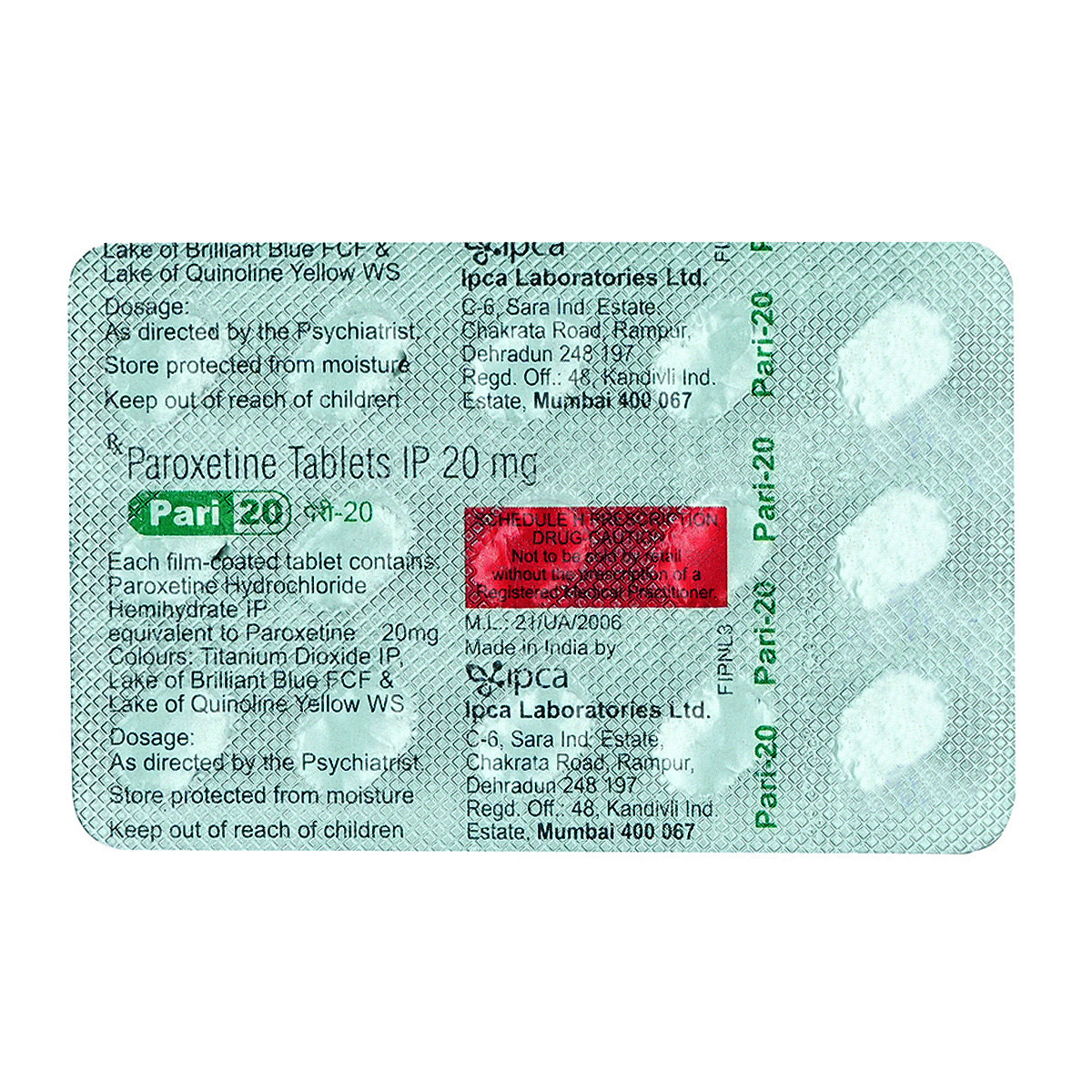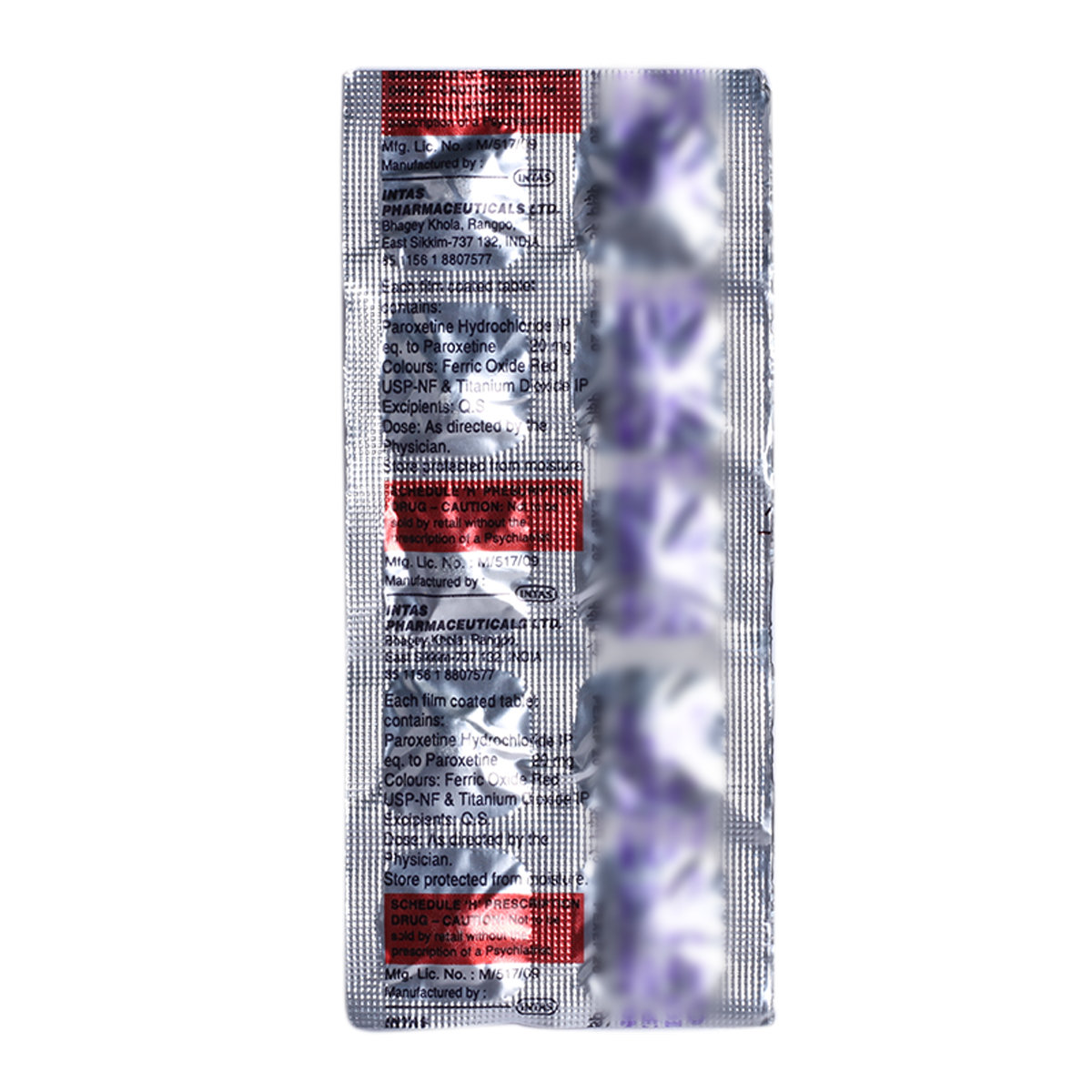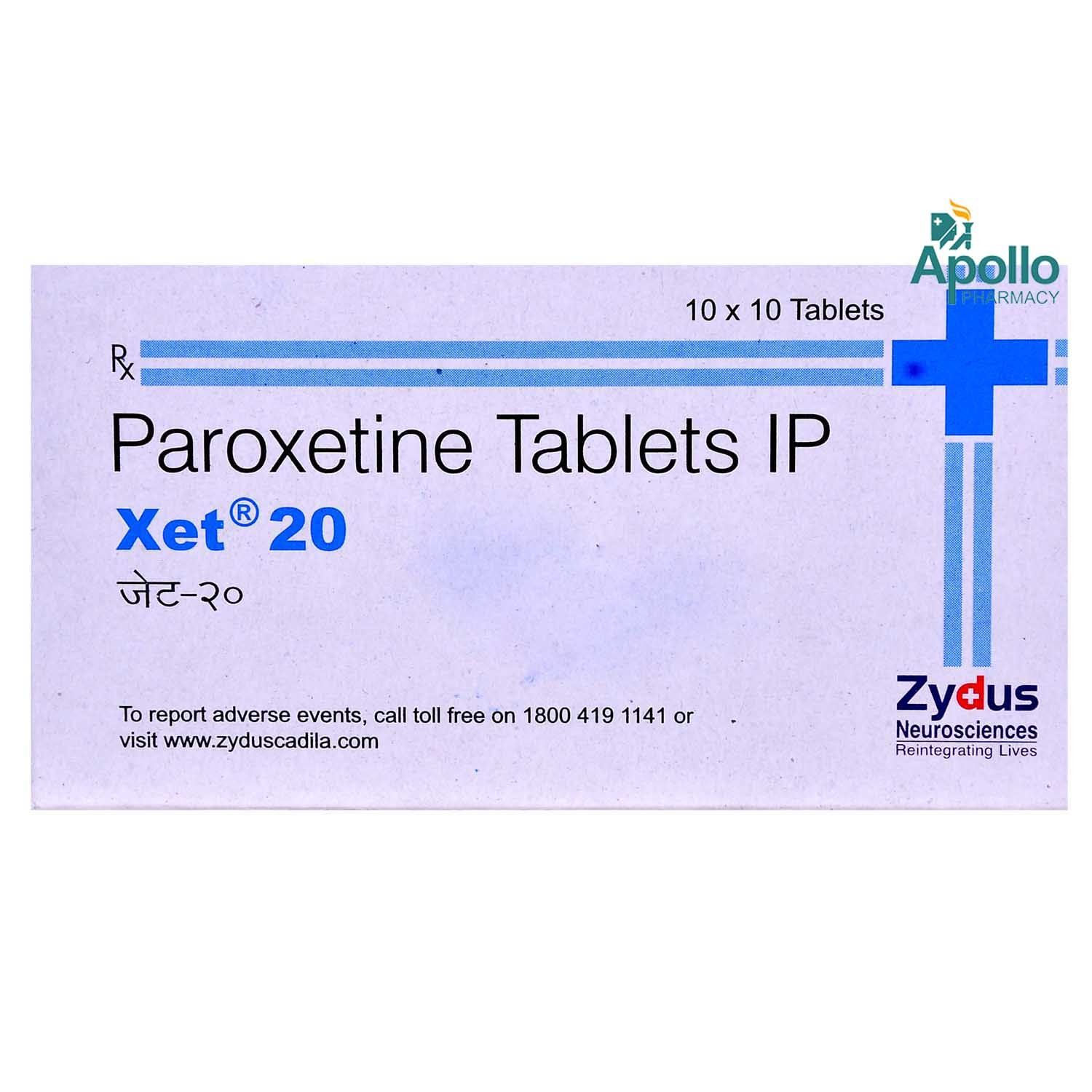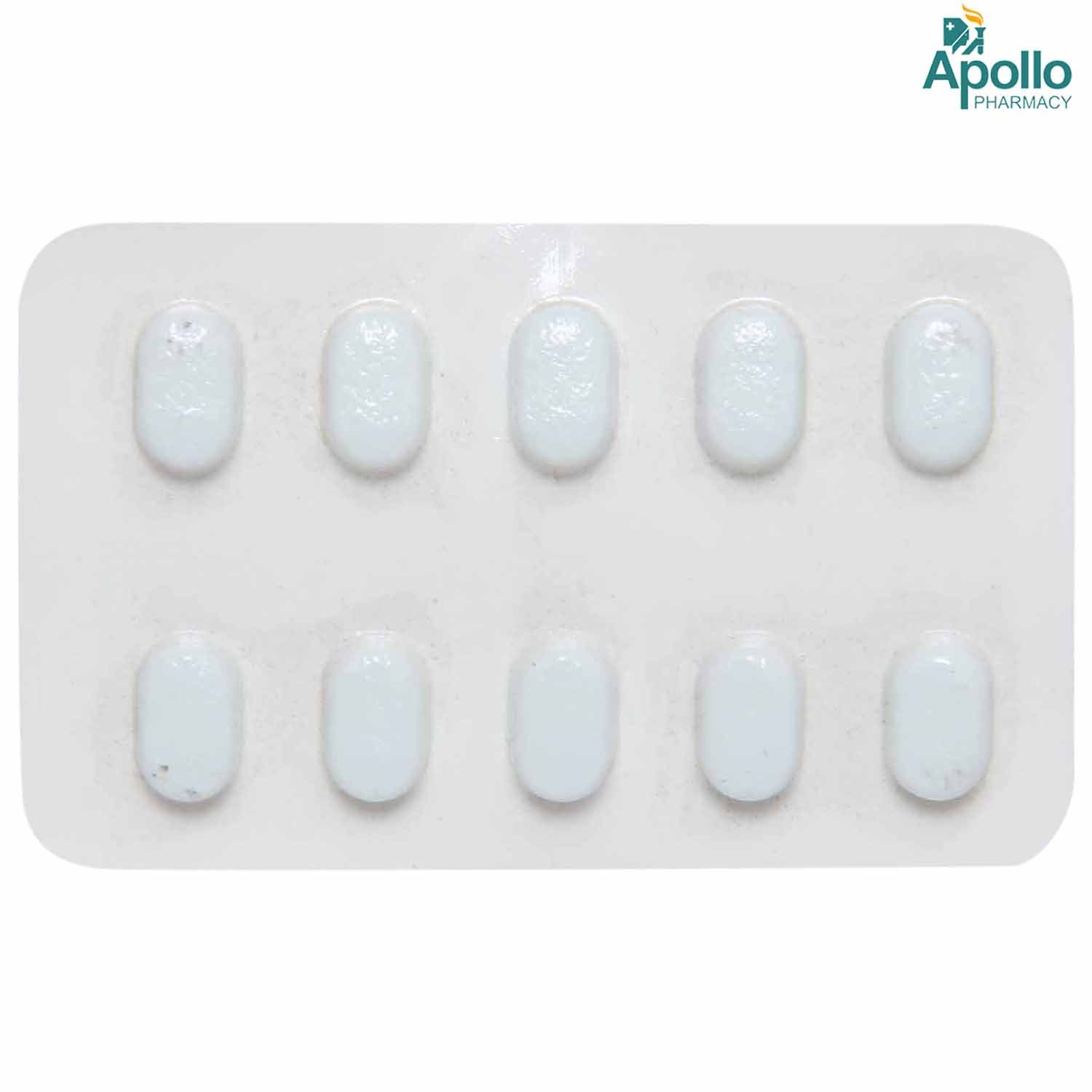Ulexetin 20mg Tablet
MRP ₹100
(Inclusive of all Taxes)
₹15.0 Cashback (15%)
Provide Delivery Location
Online payment accepted
 Prescription drug
Prescription drugWhats That
Composition :
Manufacturer/Marketer :
Consume Type :
Return Policy :
About Ulexetin 20mg Tablet
Ulexetin 20mg Tablet belongs to a group of medicines called antidepressants used to treat a major depressive disorder, obsessive-compulsive disorder (OCD), panic disorder, social anxiety disorder, post-traumatic stress disorder, premenstrual dysphoria disorder and generalised anxiety disorder. Depression is a mood disorder characterised by sadness, unhappiness, anger, hopelessness or loss that interferes with a person’s daily activities.
Ulexetin 20mg Tablet contains ‘Paroxetine’, which is a selective serotonin reuptake inhibitor. It works by inhibiting serotonin's reuptake, a mood-enhancing chemical messenger in the brain that communicates between brain cells. This helps increase serotonin concentrations in the nerve synapse, thereby regulating mood and treating depression and anxiety disorders.
Take Ulexetin 20mg Tablet as prescribed. You are advised to take Ulexetin 20mg Tablet for as long as your doctor has prescribed it for you depending on your medical condition and response to the treatment. In some cases, you may experience certain common side-effects such as insomnia (difficulty sleeping), dizziness, headache, diarrhoea, nausea, fatigue, dry mouth, loss of appetite, and sexual disturbances. You are advised to talk to your doctor if the side effects persist or worsen.
Do not take Ulexetin 20mg Tablet if you are pregnant, as it may cause harm to the foetus. Consult your doctor before taking Ulexetin 20mg Tablet if you are breastfeeding. Avoid driving or operating machinery as Ulexetin 20mg Tablet may cause dizziness, confusion, sleepiness and blurred vision. Ulexetin 20mg Tablet is not recommended for children below 18 years as the safety and effectiveness have not been established. Avoid consumption of alcohol while taking Ulexetin 20mg Tablet as it may make your symptoms or side-effects worse. Keep your doctor informed about your health condition and medicines to rule out any side-effects.
Uses of Ulexetin 20mg Tablet
Directions for Use
Key Benefits
Ulexetin 20mg Tablet belongs to a group of antidepressant medicines called selective serotonin reuptake inhibitors. Ulexetin 20mg Tablet is used to treat major depressive disorder, obsessive-compulsive disorder (OCD), panic disorder, social anxiety disorder, post-traumatic stress disorder, premenstrual dysphoric disorder, and generalised anxiety disorder. Ulexetin 20mg Tablet works by inhibiting serotonin's reuptake by nerves, a mood-enhancing chemical messenger in the brain that communicates between brain cells. This helps increase serotonin concentrations in the nerve synapse, thereby regulating mood and treating depression and anxiety disorders. Ulexetin 20mg Tablet has fewer unwanted side effects than older antidepressants and helps people recover from depression.
Storage
- Inform your doctor about the nausea and discuss possible alternatives to the medication or adjustments to the dosage.
- Divide your daily food intake into smaller, more frequent meals to reduce nausea.
- Opt for bland, easily digestible foods like crackers, toast, plain rice, bananas, and applesauce.
- Avoid certain foods that can trigger nausea, such as fatty, greasy, spicy, and smelly foods.
- Drink plenty of fluids, such as water, clear broth, or electrolyte-rich beverages like coconut water or sports drinks.
- Use ginger (tea, ale, or candies) to help relieve nausea.
- Get adequate rest and also avoid strenuous activities that can worsen nausea.
- Talk to your doctor about taking anti-nausea medication if your nausea is severe.
- Record when your nausea occurs, what triggers it, and what provides relief to help you identify patterns and manage your symptoms more effectively.
- Prepare for a restful night's sleep: Develop a calming pre-sleep routine, like reading or meditation, to help your body relax and prepare for sleep.
- Create a sleep-conducive Environment: Make bedroom a sleep haven by ensuring it is quiet, dark and calm.
- Follow a Sleep Schedule: Go to bed and get up at the same time every day to help regulate your body's internal clock and increase sleep quality.
- Try relaxing techniques like deep breathing, mindfulness meditation and any others.
- Limit stimulating activities before bedtime: Avoid stimulating activities before bedtime to improve sleep quality.
- Monitor Progress: Keep track of your sleep patterns to identify areas for improvement.
- Consult a doctor if needed: If these steps don't improve your sleep, consult a doctor for further guidance and therapy.
- Inform your doctor about dry mouth symptoms. They may adjust your medication regimen or prescribe additional medications to manage symptoms.
- Drink plenty of water throughout the day to help keep your mouth moist and alleviate dry mouth symptoms.
- Chew sugar-free gum or candies to increase saliva production and keep your mouth moisturized.
- Use saliva substitutes, such as mouthwashes or sprays, only if your doctor advises them to help moisturize your mouth and alleviate dry mouth symptoms.
- Avoid consuming smoking, alcohol, spicy or acidic foods, and other irritants that may aggravate dry mouth symptoms.
- Schedule regular dental check-ups to keep track of your oral health and handle any dry mouth issues as they arise.
- Hydrate your body: Drink enough water to prevent dehydration and headaches.
- Calm Your Mind: Deep breathing and meditation can help you relax and relieve stress.
- Rest and Recharge: Sleep for 7-8 hours to reduce headache triggers.
- Take rest: lie down in a quiet, dark environment.
- Cold or warm compresses can help reduce tension.
- Stay Upright: Maintain good posture to keep symptoms from getting worse.
- To treat headaches naturally, try acupuncture or massage therapy.
- Over-the-counter pain relievers include acetaminophen and ibuprofen.
- Prescription Assistance: Speak with your doctor about more substantial drug alternatives.
- Severe Headaches: Seek emergency medical assistance for sudden, severe headaches.
- Frequent Headaches: If you get reoccurring headaches, consult your doctor.
- Headaches with Symptoms: Seek medical attention if your headaches include fever, disorientation, or weakness.
- Rest well; get enough sleep.
- Eat a balanced diet and drink enough water.
- Manage stress with yoga and meditation.
- Limit alcohol and caffeine.
- Physical activities like walking or jogging might help boost energy and make you feel less tired.
- Inform your doctor about your constipation symptoms. They may adjust your medication or advise alternative treatments.
- Stay hydrated by drinking sufficient of water (at least 8-10 glasses a day) to help soften stool and promote bowel movements.
- Increase fibre intake by eating foods high in fibre, such as fruits, whole grains, vegetables and legumes, to help bulk up the stool.
- Establish a bowel routine by trying to go to the bathroom at the same time each day to train your bowels.
- Engaging in regular exercise, like walking or yoga, can support in bowel movement stimulation.
- Consult your doctor if constipation persists, and discuss alternative treatments or adjustments to your medication.
- Inform Your Doctor: Notify your doctor immediately about your diarrhoea symptoms. This allows them to adjust your medication or provide guidance on managing side effects.
- Stay Hydrated: Drink plenty of fluids to replace lost water and electrolytes. Choose water, clear broth, and electrolyte-rich drinks. Avoid carbonated or caffeinated beverages to effectively rehydrate your body.
- Follow a Bland Diet: Eat easy-to-digest foods to help firm up your stool and settle your stomach. Try incorporating bananas, rice, applesauce, toast, plain crackers, and boiled vegetables into your diet.
- Avoid Trigger Foods: Steer clear of foods that can worsen diarrhoea, such as spicy, fatty, or greasy foods, high-fibre foods, and dairy products (especially if you're lactose intolerant).
- Practice Good Hygiene: Maintain good hygiene to prevent the spread of infection. To stay healthy, wash your hands frequently, clean and disinfect surfaces regularly, and avoid exchanging personal belongings with others.
- Take Anti-Diarrheal Medications: If your doctor advises, anti-diarrheal medications such as loperamide might help manage diarrhoea symptoms. Always follow your doctor's directions.
- Keep track of your diarrhoea symptoms. If they don't get better or worse or are accompanied by severe stomach pain, blood, or dehydration signs (like extreme thirst or dark urine), seek medical help.
Drug Warnings
Do not take Ulexetin 20mg Tablet if you are allergic to any of its contents; if you are taking monoamine oxidase inhibitors (MAOI) or have taken them in the last 14 days, or if you are taking antipsychotic medicines such as thioridazine or pimozide. Consult your doctor immediately if you have suicidal thoughts, such as killing or harming yourself. Inform your doctor if you have/had epilepsy, mania, diabetes, low sodium levels in blood, glaucoma, or are undergoing treatment for severe depression called electro-convulsive therapy. Do not take Ulexetin 20mg Tablet if you are pregnant, as it may cause harm to the foetus. Consult your doctor before taking Ulexetin 20mg Tablet if you are breastfeeding. Avoid driving or operating machinery as Ulexetin 20mg Tablet may cause dizziness, confusion, sleepiness and blurred vision. Ulexetin 20mg Tablet is not recommended for children below 18 years as the safety and effectiveness have not been established. Avoid consumption of alcohol while taking Ulexetin 20mg Tablet as it may make your symptoms or side-effects worse.
Drug-Drug Interactions
Drug-Drug Interactions
Login/Sign Up
Taking Furazolidone with Ulexetin 20mg Tablet can increase the risk of side effects
How to manage the interaction:
Taking Ulexetin 20mg Tablet with Furazolidone is not recommended, but should be taken if advised by a doctor. However, if you experience confusion, hallucination, seizure, increased heart rate, fever, excessive sweating, shivering or shaking, or blurred vision contact your doctor immediately. Do not discontinue any medications without consulting a doctor.
Using tranylcypromine with Ulexetin 20mg Tablet can increase the risk of side effects.
How to manage the interaction:
Taking Ulexetin 20mg Tablet with Tranylcypromine is not recommended, but should be taken if advised by a doctor. However, if you experience dizziness, lightheadedness, fainting, shortness of breath, or heart palpitations contact your doctor immediately. Do not discontinue any medications without consulting a doctor.
Coadministration of Ulexetin 20mg Tablet with Thioridazine can increase the risk of irregular heart rhythm.
How to manage the interaction:
Taking Thioridazine with Ulexetin 20mg Tablet is not recommended, but should be taken if advised by a doctor. However, if you experience sudden dizziness, lightheadedness, fainting, shortness of breath, or heart palpitations contact your doctor immediately. Do not discontinue any medications without consulting a doctor.
Using Metoclopramide with Ulexetin 20mg Tablet can cause serotonin syndrome. Serotonin syndrome is a condition in which a chemical called serotonin builds up in your body, causing signs and symptoms ranging from mild (shivering and diarrhoea) to severe (muscle rigidity, fever, and seizures).
How to manage the interaction:
Taking Metoclopramide with Ulexetin 20mg Tablet is not recommended, as it can possibly lead to an interaction, it can be taken if prescribed by your doctor. Do not stop using any medications without a doctor’s advice.
When Ulexetin 20mg Tablet is taken with Selegiline, may increase the risk of serotonin syndrome (a condition in which a chemical called serotonin increases in your body).
How to manage the interaction:
Taking Ulexetin 20mg Tablet with Selegiline can possibly lead to an interaction but it can be taken if your doctor has advised it. If you notice any of these symptoms like confusion, hallucination, seizure, increased heart rate, fever, excessive sweating, shivering or shaking, blurred vision, muscle spasm or stiffness, tremor, incoordination, stomach cramps, nausea, vomiting, diarrhea, contact your doctor immediately. Do not discontinue any medications without consulting your doctor.
Using phenelzine with Ulexetin 20mg Tablet can increase the risk of side effects.
How to manage the interaction:
Taking Ulexetin 20mg Tablet with Phenelzine is not recommended, but should be taken if advised by a doctor. However, if you experience confusion, hallucination, seizure, increased heart rate, fever, excessive sweating, shivering or shaking, or blurred vision contact your doctor immediately. Do not discontinue any medications without consulting a doctor.
Using procarbazine together with Ulexetin 20mg Tablet can increase the risk of a serious condition called the serotonin syndrome(a condition in which a chemical called serotonin increase in your body).
How to manage the interaction:
Taking Ulexetin 20mg Tablet with Procarbazine is not recommended, but should be taken if advised by a doctor. However, if you experience confusion, hallucination, seizure, increased heart rate, fever, excessive sweating, shivering or shaking, or blurred vision contact your doctor immediately. Do not discontinue any medications without consulting a doctor.
Using Linezolid together with Ulexetin 20mg Tablet can increase the risk of a serious condition called serotonin syndrome (A condition resulting from the accumulation of high levels of serotonin in the body. Serotonin is a chemical that plays a role in overall wellbeing and especially a mood stabilizer).
How to manage the interaction:
Taking Ulexetin 20mg Tablet with Linezolid is not recommended but should be taken if advised by a doctor. However, if you experience confusion, hallucination, seizure, extreme changes in blood pressure, increased heart rate, fever, excessive sweating, shivering or shaking, blurred vision contact a doctor immediately. Do not discontinue any medications without consulting a doctor.
Using isocarboxazid with Ulexetin 20mg Tablet can increase the risk of side effects.
How to manage the interaction:
Taking Ulexetin 20mg Tablet with Isocarboxazid is not recommended, but should be taken if advised by a doctor. However, if you experience confusion, hallucination, seizure, extreme changes in blood pressure, increased heart rate, fever, excessive sweating, shivering or shaking, blurred vision contact your doctor immediately. Do not discontinue any medications without consulting a doctor.
Combining Ulexetin 20mg Tablet with Pimozide can effect the rhythm of the heart
How to manage the interaction:
Taking Ulexetin 20mg Tablet with Pimozide is not recommended, but should be taken if advised by a doctor. However, if you experience chest tightness, irregular heartbeat, blurred vision and nausea contact your doctor immediately. Do not discontinue any medications without consulting a doctor.
Drug-Food Interactions
Drug-Food Interactions
Login/Sign Up
Diet & Lifestyle Advise
- Maintain a healthy diet and exercise regularly as it helps in improving overall health and boosts self-esteem.
- Regularly attend therapy sessions.
- Perform meditation and yoga. This helps in relieving stress and provides relaxation.
- Follow a regular sleep pattern to improve the amount and quality of sleep you get.
- Include foods rich in omega fatty acids such as fish, nuts, fresh fruits, vegetables and olive oils.
- Neurotransmitters are made up of amino acids. Amino acid-rich foods such as meat, dairy products, and certain fruits and vegetables help in the proper maintenance of neurotransmitters.
- Complex carbohydrates help in stimulating serotonin (a feel-good neurotransmitter). These include whole grains, legumes, spinach, broccoli, oranges and pears.
- Exercising helps in the production of the body’s natural antidepressants. It also helps in relieving stress, improving mood, boosting self-esteem, and providing restful sleep.
- Avoid smoking and alcohol consumption.
- Learn about your condition, understand the risk factors and follow the doctor’s treatment plan.
Side Effects of Ulexetin 20mg Tablet
- Insomnia (difficulty sleeping)
- Headache
- Diarrhoea
- Nausea
- Fatigue
- Dry mouth
- Loss of appetite
- Sexual disturbances
Habit Forming
Therapeutic Class
All Substitutes & Brand Comparisons
RX
Out of StockOxitine PR 20mg Tablet
Psyco Remedies Ltd
₹110.2
(₹9.92 per unit)
10% COSTLIERRX
Out of StockPevaxyl 20mg Tablet
₹124
(₹11.16 per unit)
24% COSTLIERRX
Out of StockParoxekind 20 Tablet
₹140
(₹12.6 per unit)
39% COSTLIER
Author Details
We provide you with authentic, trustworthy and relevant information
Drug-Diseases Interactions
Drug-Diseases Interactions
Login/Sign Up
FAQs
Drug-Drug Interactions Checker List
- WARFARIN
- CLOPIDOGREL
- PERPHENAZINE
- THIORIDAZINE
- CLOZAPINE
- LITHIUM
- RISPERIDONE
- CLOMIPRAMINE
- MOCLOBEMIDE
- METHYLENE BLUE
- NORTRIPTYLINE
- DESIPRAMINE
- ASPIRIN
- IBUPROFEN
- CELECOXIB
- ETODOLAC
- DICLOFENAC
- MELOXICAM
- TRAMADOL
- PETHIDINE
- TAMOXIFEN
- SUMATRIPTAN
- FENTANYL
- RITONAVIR
- PHENOBARBITAL
- PHENYTOIN
- CARBAMAZEPINE
- PROPAFENONE
- FLECAINIDE
- METOPROLOL
- RIFAMPICIN
- LINEZOLID
- PRAVASTATIN
- MIVACURIUM
- ATOMOXETINE
- PROCYCLIDINE
- TRYPTOPHAN
- FOSAMPRENAVIR
- SUXAMETHONIUM
Special Advise
- Close monitoring of patients taking Ulexetin 20mg Tablet for suicidal behaviour is advised. Talk to your doctor immediately if you have thoughts of harming or killing yourself.
Disease/Condition Glossary
Major depressive disorder: Major depressive disorder, also known as clinical depression, is a mental health disorder characterised by a persistent and intense feeling of sadness for an extended duration of time. It mainly impacts mood, behaviour, and other physical functions, such as sleep and appetite. Symptoms include sadness, loss of interest, appetite changes, sleep problems, restlessness, lack of energy, feeling worthless or guilty, thoughts of harming oneself, difficulty in concentrating, making decisions, and thinking. The exact cause of depression is unknown. However, factors such as stress, changes in hormone levels, alcohol or drug abuse, abuse during childhood, certain medical conditions and medications might increase the risk of developing depression.
Obsessive-Compulsive Disorder (OCD): It is a mental disorder that is associated with repetitive thoughts (obsessions) and the urge to do things over and again (compulsions). Symptoms include fear of germs or the need to arrange objects in a specific manner.
Panic disorder: It is a type of anxiety disorder that causes panic attacks. In this condition, a person experiences a sudden feeling of fear, when, in reality, there is no danger. Symptoms include fast heartbeat, breathing difficulty, chest or stomach pain, weakness or dizziness, and sweating.
Social anxiety disorder: It is a chronic mental health condition that causes extreme fear, anxiety, embarrassment, and self-consciousness in social gatherings. Symptoms include excessive fear, worry about humiliation or embarrassment, concern about offending someone, and fear about being judged.
Post-traumatic stress disorder (PTSD): It is a disorder that is characterised by failure to recover after witnessing or experiencing a terrifying event. This condition may last for a few months or years with triggers that could bring back the memories of trauma accompanied by intense physical and emotional reactions. Symptoms include nightmares, flashbacks, anxiety or depressed mood, heightened reactivity to a stimulus, and avoidance of situations that can bring back trauma.
Generalised anxiety disorder: It is a mental health disorder characterised by feelings of anxiety, worry or fear that are strong enough to interfere with one’s daily activities. Anxiety is the body’s natural response to stress, in which the feeling of fear may be intense and debilitating. It is the most common form of emotional disorder and can affect anyone at any age. Symptoms of anxiety include rapid breathing, increased heart rate, restlessness, trouble concentrating, and difficulty falling asleep.
Premenstrual dysphoric disorder: It is a severe form of premenstrual syndrome, which includes physical and behavioural symptoms that usually resolve after the period's onset. Premenstrual dysphoric disorder causes extreme mood shifts that can disrupt work and relationships. Symptoms include irritability, anger, hopelessness, sadness, bloating, and breast tenderness.

Have a query?
Alcohol
Safe if prescribed
Avoid consumption of alcohol while taking Ulexetin 20mg Tablet as it may make your symptoms or side-effects worse.
Pregnancy
Consult your doctor
Ulexetin 20mg Tablet belongs to pregnancy category D. It is not recommended to take Ulexetin 20mg Tablet if you are pregnant or planning for pregnancy as Ulexetin 20mg Tablet might cause foetal harm.
Breast Feeding
Consult your doctor
Ulexetin 20mg Tablet may pass into breastmilk. Consult your doctor before taking Ulexetin 20mg Tablet; your doctor will decide whether Ulexetin 20mg Tablet can be taken by breastfeeding mothers or not.
Driving
Safe if prescribed
Avoid driving or operating machinery as Ulexetin 20mg Tablet may cause dizziness, confusion, sleepiness and blurred vision.
Liver
Consult your doctor
Dose adjustment may be needed in patients with liver impairment. Please consult your doctor if you have a liver impairment or any concerns regarding this.
Kidney
Consult your doctor
Dose adjustment may be needed in patients with kidney impairment. Please consult your doctor if you have kidney impairment or any concerns regarding this.
Children
Safe if prescribed
Ulexetin 20mg Tablet is not recommended for children below 18 years as the safety and effectiveness have not been established.









_0.jpg?tr=q-85)

